Isn't it fascinating how something as simple as an air filter can greatly impact your Ford Explorer's performance? By choosing the right one, you can enhance engine efficiency and boost horsepower, ultimately leading to a smoother ride. With options like the FRAM Extra Guard and K&N Reusable filters, you have several choices that promise superior filtration and better airflow. But how do you know which air filter is truly the best fit for your needs? Let's explore the top contenders and what factors you should consider in making your decision.
Quick Takeaways
- The FRAM Extra Guard filter offers superior protection, enhancing engine performance for up to 12 months or 12,000 miles.
- The Motorcraft FA1884 filter provides a vehicle-specific fit and is highly rated for its efficient air capture.
- The A-Premium Engine Air Filter offers significant cost savings while maintaining optimal performance, suitable for various Ford models.
- The K&N Reusable Filter can last up to 75,000 miles, promoting eco-friendliness and improved MPG over time.
- Regularly replacing air filters boosts horsepower, acceleration, and fuel efficiency, contributing to overall vehicle performance.
FRAM Extra Guard Replacement Engine Air Filter for Select Ford, Lincoln, Mazda, and Mercury Models
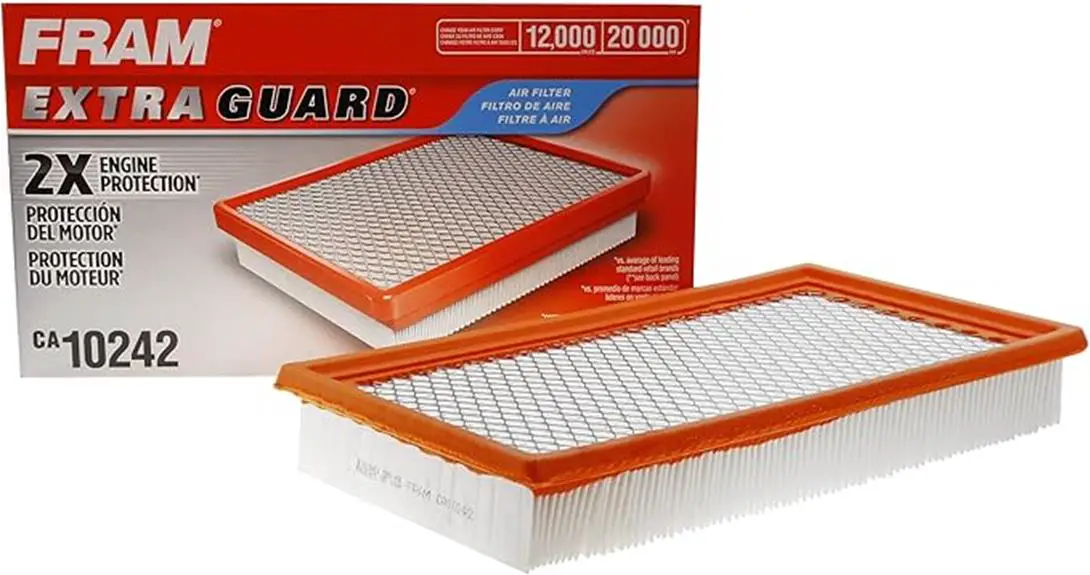
The FRAM Extra Guard Replacement Engine Air Filter stands out as an ideal choice for owners of select Ford Explorer models, offering superior protection for up to 12 months or 12,000 miles. Engineered for enhanced performance, this filter provides double the protection compared to standard options. It's compatible with various vehicles, including specific Ford, Lincoln, Mazda, and Mercury models, ensuring broad usability across different engines. The filter effectively traps dirt and debris, promoting cleaner engine performance while preventing decreased acceleration and horsepower. Installation is a breeze, taking just minutes to replace the old filter. Customers appreciate its fit and performance, noting easy installation and overall quality, although some mention minor issues with the rubber rim's finish.
Best For: Owners of select Ford, Lincoln, Mazda, and Mercury models looking for a reliable and easy-to-install engine air filter.
Pros:
- Enhanced protection for up to 12 months or 12,000 miles, doubling the performance of standard filters.
- Easy installation process that can be completed in minutes without special tools.
- Improves engine performance by trapping dirt and debris, preventing decreased acceleration and horsepower.
Cons:
- Some customers report minor issues with the rubber rim's finish, which may affect the overall aesthetic.
- Compatibility may be limited to specific vehicle models, requiring careful selection.
- Price point may be higher compared to some standard filters on the market.
Motorcraft FA1884 Air Filter
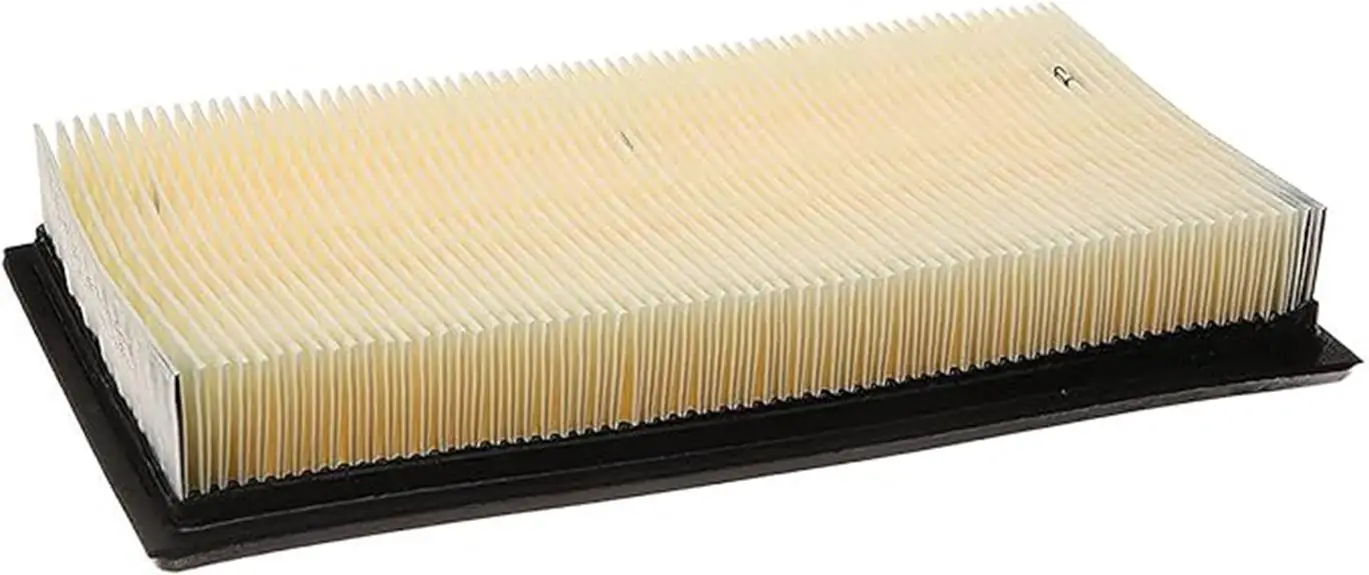
For Ford Explorer owners seeking reliable performance and ease of installation, the Motorcraft FA1884 Air Filter stands out as an exceptional choice. Constructed from durable polyurethane, this filter efficiently captures outside air while resisting damage from oil and moisture. With dimensions of 10.73L x 10.68W x 4.49H inches and weighing just 9.4 ounces, it's designed for a vehicle-specific fit, ensuring leak-proof operation. Installation is straightforward, typically taking around three minutes, though some users suggest removing additional components for easier access. With an impressive average rating of 4.8 out of 5 stars from over 1,600 reviews, many appreciate its perfect fit and cost-effectiveness compared to dealership prices, making it a preferred option for maintaining peak performance.
Best For: Ford Explorer owners looking for a high-quality, easy-to-install air filter that offers excellent performance and durability.
Pros:
- Efficiently filters outside air while resisting damage from oil and moisture.
- Designed for a vehicle-specific fit, ensuring leak-proof operation.
- Highly rated by customers for its perfect fit and cost-effectiveness compared to dealership prices.
Cons:
- Some users reported difficulty in opening the housing for installation.
- Installation may require unscrewing additional components for better access.
- Performance may vary for those transitioning from cleanable or dry filters.
FRAM Extra Guard Replacement Engine Air Filter for Select Ford, Lincoln, and Mercury Models
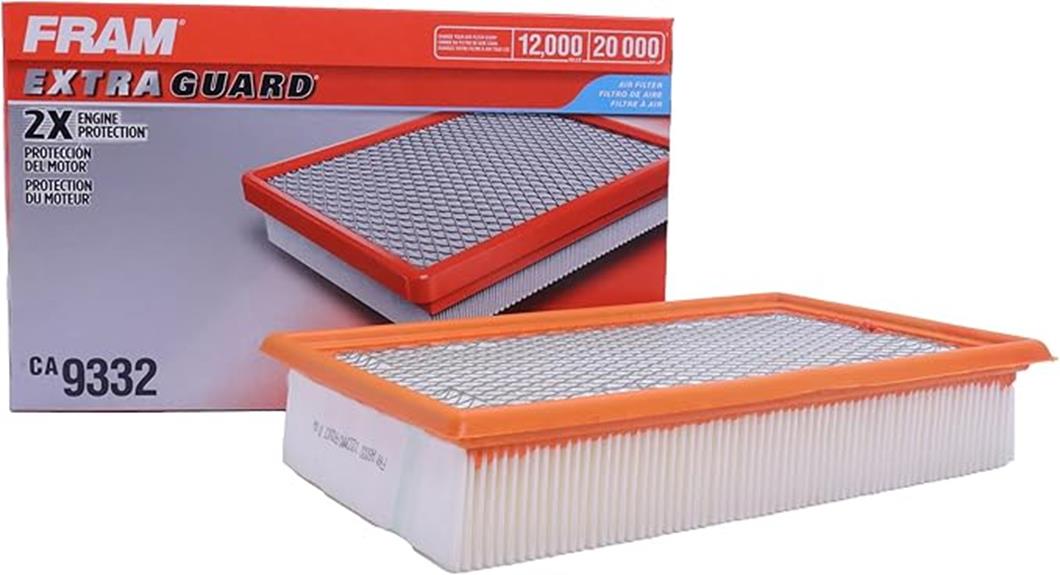
Designed specifically for select Ford, Lincoln, and Mercury models, the FRAM Extra Guard Replacement Engine Air Filter stands out as an ideal choice for owners looking to enhance their vehicle's performance. This filter, model CA9332, offers exceptional protection for up to 12 months or 12,000 miles, utilizing advanced filter media that captures twice as much dirt compared to standard filters. It's compatible with a range of models, including the 2002-2010 Ford Explorer and Mercury Mountaineer. Replacing a dirty filter with the FRAM Extra Guard can notably improve horsepower and acceleration. Installation is quick and straightforward, requiring only a few minutes. With positive customer feedback and competitive pricing, the FRAM Extra Guard is a reliable option for maintaining engine health.
Best For: Vehicle owners of select Ford, Lincoln, and Mercury models seeking to improve engine performance and longevity through easy maintenance.
Pros:
- Effective filtration: Captures 2X more dirt than average standard filters, protecting engine components.
- Easy installation: Can be replaced in just a few minutes with minimal tools required.
- Cost-effective: Competitive pricing compared to manufacturer replacement parts, offering good value.
Cons:
- Limited compatibility: Only fits specific Ford, Lincoln, and Mercury models, which may not suit all vehicle owners.
- Regular replacement needed: Requires changing every 12 months or 12,000 miles, which may be seen as frequent for some users.
- Performance may vary: Actual performance improvements can depend on overall vehicle condition and driving habits.
A-Premium Engine Air Filter for Ford, Lincoln, Mazda & Mercury Models
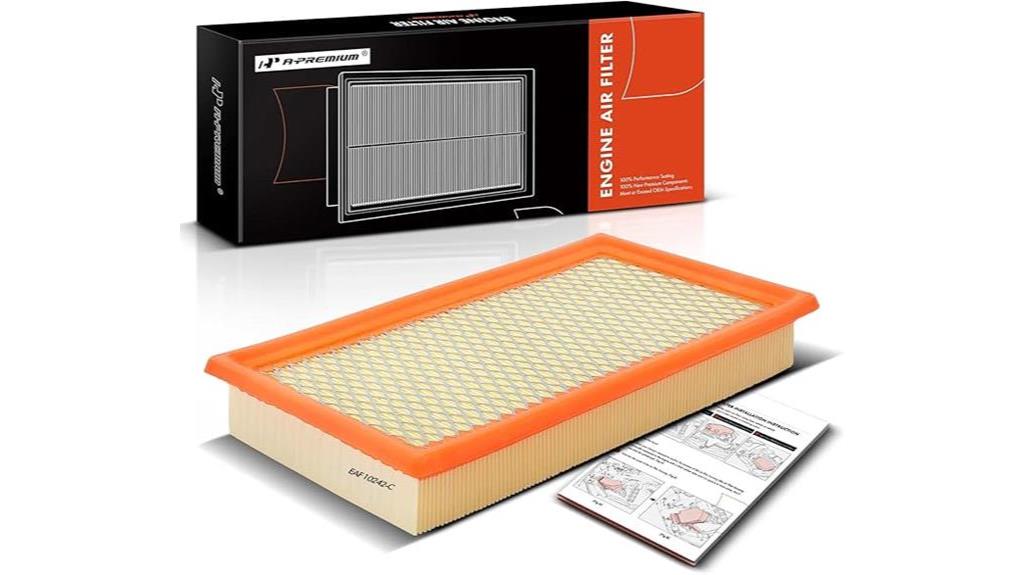
Compatible with a range of Ford, Lincoln, Mazda, and Mercury models, the A-Premium Engine Air Filter stands out as an excellent choice for owners seeking enhanced engine performance and efficiency. This filter fits popular models such as the Ford Explorer (2011-2023) and Lincoln Aviator (2020-2023), making it a versatile option for many drivers. Measuring 12.01 inches in length and 6.69 inches in width, it effectively captures debris and harmful particles, promoting peak engine function. A-Premium recommends replacing the filter every 12,000 miles to maintain performance. Customers appreciate its easy installation and high quality, often highlighting significant cost savings compared to dealer prices. With a 30-Day Return Guarantee, it's a reliable choice for those wanting to improve their vehicle's air filtration system.
Best For: Owners of Ford, Lincoln, Mazda, and Mercury vehicles looking for an affordable and efficient engine air filter to enhance performance.
Pros:
- High-quality construction ensures effective filtration and improved engine efficiency.
- Cost-effective alternative to dealership prices, leading to significant savings.
- Easy installation process reported by customers, making it user-friendly.
Cons:
- Some customers reported fitment issues with specific models.
- Non-washable and non-reusable, requiring regular replacements.
- Recommended replacement interval of every 12,000 miles may be frequent for some users.
K&N Reusable Engine Air Filter (Compatible with 2007-2019 Ford/Lincoln)
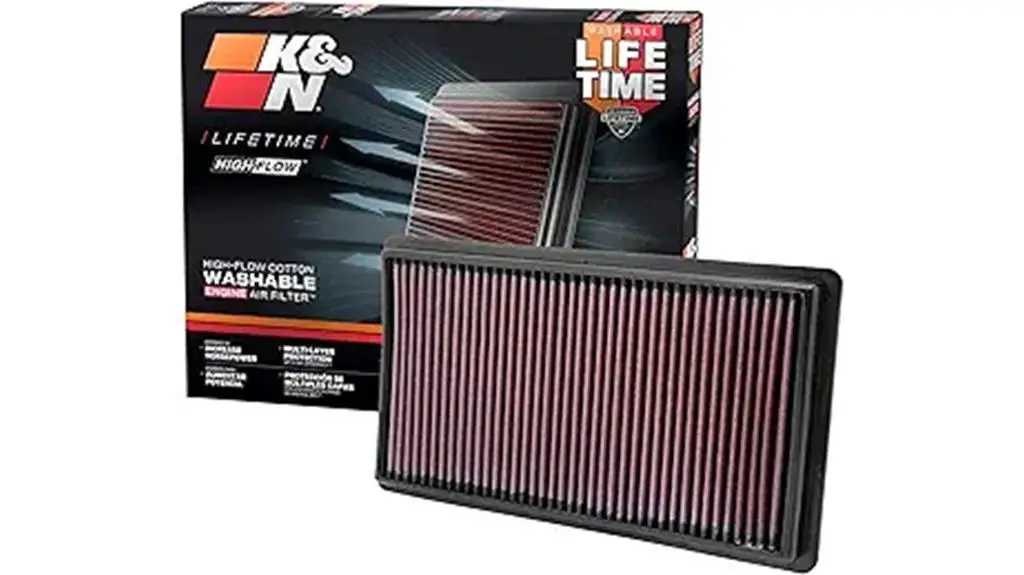
The K&N Reusable Engine Air Filter stands out as an excellent choice for 2007-2019 Ford and Lincoln SUV owners looking to enhance their vehicle's performance while saving money. This washable replacement filter, compatible with models like the Explorer and Taurus, can save users up to $125 over 200,000 miles. Designed for easy installation, it drops right into the factory air box and requires minimal maintenance—just wash it every 75,000 miles. Users report improved horsepower and fuel efficiency, with some noting gains from 15.9 to 17.1 miles per gallon. With its eco-friendly design, the K&N filter reduces landfill waste, making it a smart choice for both performance and the environment.
Best For: Owners of 2007-2019 Ford and Lincoln SUVs seeking enhanced performance and cost savings through a reusable air filter.
Pros:
- Cost-effective: Saves up to $125 over 200,000 miles compared to disposable filters.
- Performance improvement: Increases horsepower and fuel efficiency, with reported gains in MPG.
- Eco-friendly: Reduces waste by minimizing the number of disposable filters ending up in landfills.
Cons:
- Initial investment: Higher upfront cost compared to traditional disposable filters.
- Maintenance requirement: Needs to be cleaned every 75,000 miles, which may be inconvenient for some users.
- Variable performance results: Individual experiences with improvements in fuel efficiency may vary.
Factors to Consider When Choosing Air Filters for Ford Explorer
When choosing air filters for your Ford Explorer, you'll want to take into account several key factors. Make sure the filter is compatible with your specific model, and think about how it can enhance your vehicle's performance. Don't forget to evaluate the installation difficulty, maintenance needs, and overall cost-effectiveness over time.
Filter Compatibility With Models
Selecting the right air filter for your Ford Explorer hinges on understanding the unique requirements of your specific model year and engine type. Different model years can have varying specifications, so it's essential to verify compatibility with your engine configuration. The Ford Explorer has offered multiple engine options over the years, and using an incompatible filter could hinder your SUV's performance.
Before making a purchase, check if the air filter is designed for your specific model year, especially for ranges like the 2002-2010 Ford Explorer. Many air filters provide effective protection for up to 12,000 miles or 12 months, making it important to align the filter's replacement interval with your vehicle's maintenance schedule.
Additionally, consider using OEM filters, which are engineered with vehicle-specific fittings. These filters guarantee a proper seal and can enhance your engine's performance and efficiency when matched with the correct model. By paying attention to these compatibility factors, you'll help maintain your Ford Explorer's performance and guarantee it runs smoothly for years to come.
Performance Enhancements Offered
Choosing the right air filter not only assures compatibility with your Ford Explorer but also opens the door to performance enhancements that can greatly boost your driving experience. Upgrading to a high-quality air filter can markedly increase your SUV's horsepower and acceleration by effectively trapping harmful contaminants, which enhances overall engine performance.
Filters featuring advanced technology capture more dirt and debris, preventing decreased engine efficiency and promoting smoother operation. Regularly replacing your air filter can lead to improved fuel efficiency, with some users reporting increases of up to 3% in miles per gallon.
High-performance air filters are designed to maintain ideal airflow, contributing to better engine responsiveness and reducing strain on the engine. When you choose filters specifically engineered for the Ford Explorer, you guarantee a perfect fit that maximizes filtration efficiency and performance benefits.
Installation Difficulty Level
Installing an air filter in your Ford Explorer can be a straightforward task that even novice DIYers can tackle with ease. Most air filters can be installed in under 5 minutes, making it a quick and hassle-free process. You'll typically start by removing the old filter, inserting the new one, and ensuring a proper seal to prevent air leaks.
Before you get started, it's wise to let the new filter acclimate to room temperature. This helps avoid stiffness in the rubber rim, which can complicate the fitting. While many filters have user-friendly designs, some installations might require unscrewing additional components or removing covers for better access. This could add a bit of time to the process but is usually manageable.
Maintenance and Cleaning Needs
When it comes to maintaining your Ford Explorer's performance, understanding the maintenance and cleaning needs of air filters is fundamental. Regularly replacing disposable air filters every 12,000 miles is essential to guarantee peak engine performance and efficiency. If you opt for reusable air filters made from premium cotton gauze, you can wash and reuse them for up to 75,000 miles, which greatly cuts down on waste and long-term costs.
Proper installation of air filters is critical. Make sure they create a proper seal to prevent dirt and debris from entering the engine. Some filters may require you to verify they're at room temperature before installation; this helps avoid stiffness in the rubber rim that could compromise the seal.
Don't overlook the importance of regularly checking and maintaining your air filters. Doing so can lead to improved fuel efficiency and overall engine performance, with some users reporting up to a 3% increase in fuel economy. By staying on top of these maintenance needs, you can keep your Ford Explorer running smoothly and efficiently for years to come.
Cost-Effectiveness Over Time
Cost-effectiveness is an essential factor to take into account when selecting air filters for your Ford Explorer. One of the best ways to save money over time is by choosing reusable air filters. These filters can save you up to $125 over 200,000 miles compared to multiple disposable filters. While disposable options typically need replacement every 12,000 to 15,000 miles, reusable filters can last up to 75,000 miles, considerably reducing how often you'll need to buy new ones.
Although the initial investment in high-quality air filters might be higher, their durability and performance enhancements can lead to lower fuel costs and improved engine efficiency. Regularly replacing air filters, as recommended, not only maintains your vehicle's performance but also helps prevent costly engine damage, saving you money on potential repairs.
Additionally, selecting filters that efficiently trap dirt and debris can improve your Explorer's performance and fuel efficiency, leading to savings at the pump. Overall, considering the long-term cost implications of your air filter choice can make a considerable difference in your vehicle's operational expenses.
Environmental Impact Considerations
Choosing the right air filter for your Ford Explorer isn't just about performance and savings; it's also about making a positive impact on the environment. By opting for a reusable air filter, you can greatly reduce waste. Every year, over 200 million disposable air filters end up in landfills, contributing to pollution. Since disposable filters typically need replacing every 12,000 to 15,000 miles, this leads to higher resource consumption and increased environmental impact.
In contrast, reusable air filters can last up to 75,000 miles with proper care, offering a more sustainable option. This choice not only minimizes the number of filters you toss out but can also save you around $125 over your vehicle's lifespan. You're helping lessen the carbon footprint associated with filter production and disposal, which requires considerable energy and resources.
Moreover, using a quality air filter can improve your engine's efficiency. Better fuel economy means you save money at the pump while reducing greenhouse gas emissions. So, when you choose an air filter, consider its environmental impact, and make a decision that benefits both your vehicle and the planet.
Material Quality and Durability
The impact of air filters on your Ford Explorer goes beyond just environmental considerations; material quality and durability play a significant role in performance and longevity. When choosing an air filter, look for options made from high-quality materials like polyurethane, which resist oil and moisture, enhancing both durability and performance.
Filters with advanced filter media can capture more dirt and debris, ensuring cleaner airflow to your engine. This not only helps maintain ideal performance but also reduces the frequency of replacements, saving you time and money. Consider filters made with multiple layers of premium materials, such as cotton gauze. These can effectively trap harmful contaminants while contributing to increased horsepower and overall engine efficiency.
Durability is vital, so assess features like leak-proof designs and the ability to withstand various environmental conditions. Such features are essential for maintaining ideal engine performance and extending the lifespan of your filter. Investing in a high-quality air filter made from durable materials can lead to significant improvements in your Ford Explorer's efficiency and longevity, ensuring you get the most out of your driving experience.
Replacement Interval Recommendations
When it comes to maintaining your Ford Explorer, understanding replacement interval recommendations for air filters is vital for ideal engine performance. Most standard engine air filters should be replaced every 12,000 to 15,000 miles to keep your engine running efficiently. If you opt for reusable air filters, they typically require cleaning every 75,000 miles, offering a longer lifespan compared to disposable options.
However, consider your driving conditions; if you frequently drive in dusty or polluted environments, you'll want to replace your air filter more often. Regular inspection is important, as visible dirt buildup or damage can indicate the need for an earlier replacement than the standard interval.
Always follow the manufacturer's guidelines for air filter replacement. Neglecting this can lead to reduced acceleration and horsepower, negatively impacting your vehicle's overall performance. By staying on top of these recommendations, you'll guarantee that your Ford Explorer runs smoothly and efficiently, maximizing both performance and longevity.
Common Questions
How Often Should I Replace the Air Filter in My Ford Explorer?
You should replace the air filter in your Ford Explorer every 15,000 to 30,000 miles, but it really depends on your driving conditions. If you often drive in dusty environments or heavy traffic, check it more frequently. A clean air filter improves engine performance and fuel efficiency, so don't neglect it! Regularly inspecting your air filter will help maintain your SUV's overall health and guarantee it runs smoothly for years to come.
Can a Dirty Air Filter Affect My Fuel Efficiency?
Yes, a dirty air filter can definitely affect your fuel efficiency. When the filter's clogged, it restricts airflow to your engine, making it work harder to draw in air. This extra effort can lead to increased fuel consumption. You might notice a drop in mileage, and your engine's performance may suffer too. Regularly checking and replacing your air filter can help maintain ideal fuel efficiency and keep your engine running smoothly.
Are Aftermarket Filters Better Than OEM Filters for My Ford Explorer?
Imagine your Ford Explorer as a bird, soaring through the skies. You want it to breathe freely, right? Aftermarket filters often promise improved airflow and filtration, enhancing your engine's performance. However, OEM filters are designed specifically for your vehicle, ensuring a perfect fit and reliability. It boils down to your priorities—if you seek performance, aftermarket might be better, but if you value dependability, stick with OEM. Choose wisely to keep your bird flying high!
Do I Need Any Special Tools to Change the Air Filter?
You don't need any special tools to change your air filter. Most air filters are easily accessible and can be replaced with just a screwdriver or your hands. Simply pop the hood, locate the air filter housing, and remove the cover. If your vehicle has clips or screws, just loosen them. Then, take out the old filter, insert the new one, and secure everything back in place. It's a straightforward task!
Is It Safe to Clean and Reuse an Air Filter?
It's generally safe to clean and reuse an air filter, but it depends on the type. If you're using a reusable filter, like a foam or cotton one, just make sure to follow the manufacturer's cleaning instructions. However, disposable filters aren't meant to be cleaned; they lose effectiveness once dirt accumulates. Always inspect for wear or damage before reinstalling. If it's too dirty or damaged, it's best to replace it for peak performance.
Wrapping Up
To sum up, upgrading your Ford Explorer's air filter can greatly boost performance and efficiency. Did you know that a clean air filter can improve fuel efficiency by up to 10%? By choosing one of the top filters we've discussed, you're not just enhancing your vehicle's responsiveness but also saving money at the pump. Regular maintenance and timely replacements are key to getting the most out of your SUV, so don't overlook this simple yet effective upgrade!